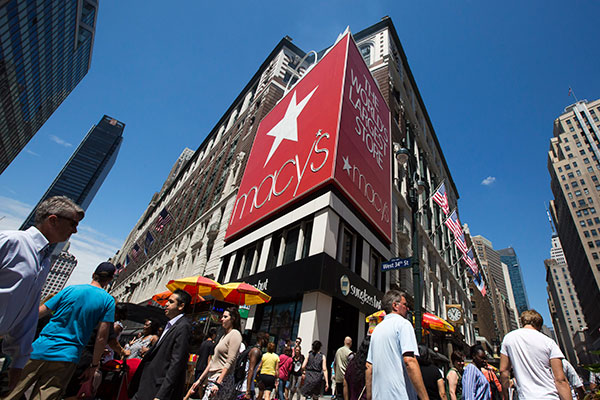 |
|
Pedestrians walk through Herald Square past a Macy's Inc department store in New York.[Photo provided to China Daily] |
Macy's Inc, the iconic United States mid-range department store chain, is to debut in China later this year by opening a store on the country's leading e-commerce platform, Tmall.
The company has formed a joint venture with Hong Kong-based Fung Retailing Ltd to handle its first foray into China.
Macy's China Ltd, to be based in the special administrative region, will be 65 percent owned by the US firm and 35 percent owned by Fung Retailing.
It will sell on Tmall Global, owned by Alibaba Group Holding Ltd, which connects overseas branded retailers to Chinese consumers and already offers a strong number of quality foreign brands.
Macy's officials said the China operation is expected to be up and running by the end of the year, and has a sales target of around $50 million for 2016.
Terry Lundgren, the Macy's chairman and chief executive officer, said the venture will sell an assortment of its merchandise aimed specifically at Chinese customers, with orders being handled from Hong Kong through LF Logistics, a Fung Retailing affiliate.
Retail analysts said the move by the famous US outlet was significant in its difference from previous attempts to move into China by global players, such as France's The Galeries Lafayette and the United Kingdom's Marks & Spencer Plc, in that there are no actual brick-and-mortar stores involved.
Lundgren said, however, that while no physical stores are currently planned, they may be considered in future based on the results of the e-commerce operation.
He said managing its inventories from Hong Kong would be quick, flexible and affordable for customers, who will pay for goods primarily through Alipay, Alibaba's online payment services.
"We have been closely following the development of the Chinese marketplace for many years and have learned that success requires that we have the right partners to help us navigate the unique needs and characteristics of consumers in China," said Lundgren.
Macy's own figures suggest China now has 668 million Internet users, many of whom are shopping online, and it has forecast the country will have 630 million middle-class spenders by 2022.
The firm began selling to 100 countries on macys.com in 2011, including China, but goods were always shipped to international customers from the United States.
With around 790 stores, Macy's had disappointing second quarter group sales this year of $6.1 billion, a 2.6 percent fall on the same period last year.
Jason Yu, general manager of Kantar Worldpanel China, said retail consumers in China are increasingly looking for a wider variety of quality brands from overseas, and are willing to pay for the type of products offered by Macy's.
"Opening its own brick-and-mortar stores would be very expensive and risky," said Yu.
"We have seen store closures by many local department stores as well as foreign players such as Mark & Spencer over the past two or three years due to changing consumer shopping behavior and a switch to e-commerce stores."
He said that by working with Alibaba, Marcy's can access Tmall's enormous customer base immediately, though it will still have to compete with some aggressive incumbent retail players already selling on the platform.
Amazon China, the Chinese division of the multinational e-commerce giant, also announced on Thursday plans to offer more overseas products in the country by allowing online Chinese shoppers access to its e-commerce sites in the United States, Japan and Europe.
Meng Jing contributed to this story.
